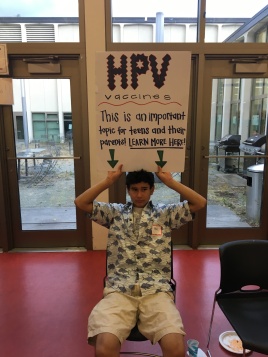Crossposted from the Best Starts for Kids blog.
Best Starts for Kids is excited to announce our partnership with the University of Washington School of Public Health, Department of Epidemiology and the Northwest Center for Public Health Practice. As the awardee of the Best Starts Adolescent Immunization Learning Collaborative RFP, the University of Washington will work with the Public Health Seattle & King County Immunization Program to establish a learning collaborative aimed at increasing vaccination coverage rates for adolescents and teens, protecting them and others from serious infectious diseases. The project will seek to identify and address disparities in coverage while promoting the overall uptake in King County youth vaccination rates. This will be a quality improvement initiative, meaning it will employ evidence-based strategies and activities to drive improvements in the quality of health care. The total amount of the award is $600,000 over a three-year period. Learn more from UW’s announcement here.
Why Does it Matter?
Vaccinations are crucial towards preventing infectious diseases that pose a threat to a child’s ability to survive, grow and thrive. We typically think of immunizations happening in early childhood, before a child reaches 11 or 12 years old. However, children should receive vaccines throughout childhood, including critical immunizations that are recommended for teens and adolescents. However, as kids get older, they get busier, and it can be challenging to schedule wellness visits in order ensure that they receive all recommended vaccinations when they are due. Adolescents and teens can often fall behind on important immunizations, leaving them vulnerable to preventable illness.
Prevention is an important part of Best Starts’ philosophy and how we do our work.
Best Starts for Kids is excited to announce our partnership with the University of Washington School of Public Health, Department of Epidemiology and the Northwest Center for Public Health Practice. As the awardee of the Best Starts Adolescent Immunization Learning Collaborative RFP, the University of Washington will work with the Public Health Seattle & King County Immunization Program to establish a learning collaborative aimed at increasing vaccination coverage rates for adolescents and teens, protecting them and others from serious infectious diseases. The project will seek to identify and address disparities in coverage while promoting the overall uptake in King County youth vaccination rates. This will be a quality improvement initiative, meaning it will employ evidence-based strategies and activities to drive improvements in the quality of health care. The total amount of the award is $600,000 over a three-year period. Learn more from UW’s announcement here.
Why Does it Matter?
Vaccinations are crucial towards preventing infectious diseases that pose a threat to a child’s ability to survive, grow and thrive. We typically think of immunizations happening in early childhood, before a child reaches 11 or 12 years old. However, children should receive vaccines throughout childhood, including critical immunizations that are recommended for teens and adolescents. However, as kids get older, they get busier, and it can be challenging to schedule wellness visits in order ensure that they receive all recommended vaccinations when they are due. Adolescents and teens can often fall behind on important immunizations, leaving them vulnerable to preventable illness.
Prevention is an important part of Best Starts’ philosophy and how we do our work.

Best Starts works to decrease things that may prevent babies, children and young people from growing up to be healthy, happy adults. This includes preventing diseases that we know can cause problems down the line. That’s why the focus of this partnership will be engaging healthcare providers to make sure they are encouraging parents and guardians to get their teens vaccinated against preventable infections, particularly HPV. When administered at the recommended ages, the HPV vaccine is the one of the only federally approved vaccines that can actually prevent cancer.
HPV is the most common sexually transmitted infection in the United States. According to the Centers for Disease Control and Prevention, most sexually active people will contract the virus at some point in their lives. It is easily transmitted, condoms do not offer complete protection from the disease, and it often has no symptoms. However, certain strains of the virus are known to cause several types of cancer in both men and women. Stigmas around sexual behavior, poor understanding about the need for the vaccine, and misinformation about general vaccine safety have contributed to poor vaccine uptake. The emphasis on disease transmission also led to misperceptions about the importance of vaccinating at a younger age. Parents often don’t understand why their pre-teens need to be vaccinated for a sexually transmitted disease and can be uncomfortable discussing this with their healthcare provider.

Early adolescence is the optimal time to get young people vaccinated. Not only is it critical to complete the HPV vaccination series well before a young person becomes sexually active, girls and boys have a stronger protective immune response to the vaccine when they get it at a younger age.
Through this partnership, we’ll build a learning collaborative of healthcare providers to find the best ways to increase vaccine rates for adolescents and make vaccination against HPV a routine part of adolescent health care visits.
Equity
Talking about vaccination is particularly important for immigrant and refugee families who may not have discussed vaccination with a health care provider before. This partnership will focus on improving culturally appropriate and relevant information about vaccinations to reduce disparities in vaccine coverage.
Medical providers need!
Are you a medical provider? Contact us to participate! Email Christiann Stapf at cstapf@kingcounty.gov.
Do you know medical providers who may be interested? Share this with them and encourage them to contact us!


